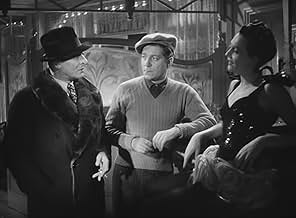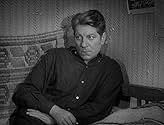Le jour se lève
- 1939
- Tous publics
- 1h 33min
NOTE IMDb
7,7/10
8,7 k
MA NOTE
Après avoir commis un meurtre, un homme s'enferme dans son appartement et se souvient des événements qui l'ont conduit au meurtre.Après avoir commis un meurtre, un homme s'enferme dans son appartement et se souvient des événements qui l'ont conduit au meurtre.Après avoir commis un meurtre, un homme s'enferme dans son appartement et se souvient des événements qui l'ont conduit au meurtre.
- Réalisation
- Scénario
- Casting principal
- Récompenses
- 1 nomination au total
René Génin
- Le concierge
- (as Genin)
Arthur Devère
- Mr. Gerbois
- (as Arthur Devere)
René Bergeron
- Le patron du café
- (as Bergeron)
Marcel Pérès
- Paulo
- (as Peres)
Annie Cariel
- Une locataire
- (non crédité)
Georges Douking
- L'aveugle
- (non crédité)
Georges Gosset
- Un agent
- (non crédité)
Avis à la une
the main setting of "le Jour Se Leve" is the top floor of a french apartment. the film opens with Jean Gabin character Francois - a factory worker- killing a dog trainer named Valentin who we find out (as the story unravels itself) was "involved" with his girl. Francois then barricades himself from the police, and the reason for the death of Valentin is told in simple sets of flashbacks that Gabin remembers between cigarettes as he decides what his next move will be. the story is simple and delicate in manner and substance but nonetheless the director/writer team Marcel Carne and Jacques Prevert succeed in turning the realistic (and sometimes edgy) conversations, movements and places into poetry. and in response to an earlier review, the simplicity of the flashbacks, is what makes the movie so intriguing. instead of relying on a heavy plot that might challenge audience, Prevert and Carne decide to put great detail into a simple tale about a sentimental man who is torn to ruin by a contemptuous and Machiavellian man.
There is something so lyrical about the tale of the doomed François portrayed by the great Jean Gabin that even in its hardest luck moments you feel you are watching poetry in motion.
In addition, Le Jour se Leve is a character study with all the contradictions that tend to go with pained souls like François' - except that there is a further depth that renders the film quite universal, a depth made of little moments in human relationships and the flaws that gently emerge but only renders the humans involved more endearing.
Still, all that glitters is not gold: the apparently pure Françoise has actually been bedded by M. Valentin (Berry); and the police are more interested in getting their man than in saving him.
The direction is precise and inspired, resorting to the then much used flashback technique but never allowing it to dominate the film.
The photography - well, it is gorgeous and it gives the film its expressionistic ambiance. Finally, Gabin - one of the greatest actors ever in one of his greatest roles. Need one say more?
The ending can be predicted from the moment François kills a visitor in his apartment but that aside it is a film full of cinematographic treasures, acting to gape at, and a quality of direction that is seldom seen these days. A must see for anyone who cares about movies.
In addition, Le Jour se Leve is a character study with all the contradictions that tend to go with pained souls like François' - except that there is a further depth that renders the film quite universal, a depth made of little moments in human relationships and the flaws that gently emerge but only renders the humans involved more endearing.
Still, all that glitters is not gold: the apparently pure Françoise has actually been bedded by M. Valentin (Berry); and the police are more interested in getting their man than in saving him.
The direction is precise and inspired, resorting to the then much used flashback technique but never allowing it to dominate the film.
The photography - well, it is gorgeous and it gives the film its expressionistic ambiance. Finally, Gabin - one of the greatest actors ever in one of his greatest roles. Need one say more?
The ending can be predicted from the moment François kills a visitor in his apartment but that aside it is a film full of cinematographic treasures, acting to gape at, and a quality of direction that is seldom seen these days. A must see for anyone who cares about movies.
sentimental, far to be great, almost common. but seductive under the science of Carne to give delicate nuances to flash backs, to transform scenes in little gems. and, in same measure, the art of Prevert to transform each detail in a precise piece of puzzle. a film about love and innocence. about a kind of Mephisto - remarkable performance of Berry - and delicate lights of role in Jacqueline Laurent performance. but, in many aspects, a film of Arletty and Jean Gabin. not a surprise. the names of director and scriptwriter are basic guarantees for a remarkable work. but, after so many years, like many other films," Le jour se leve" has more seductive sparkles and great profound value.
Told in flashbacks, the story slowly enfolds to explain the death that started the movie. A very touching love story. The guy is just trying to find a little love in his daily struggle to work a dead end job and make ends meet. There is miscommunication between some couples. Characters are unsure about what it is they really want out of life. Events lead tragically to a death. Trapped in his room by the police, the crowd responds with varying degrees of sympathy and confusion. Was the death inevitable? Those are the questions. In the end, you understand how the situation could have ended differently. You will enjoy this movie.
Carne and Prevert on a roll; hot on the heels of 'Quai des Brumes' comes this, next up will be Les Visiteurs du Soir' and THAT will be followed by 'Les Enfants du Paradis'. Get out of that, John Ford/Dudley Nichols. Where do you start with something like this, someone send a Runner for a new set of superlatives. Start with the heavy? Jules Berry, they don't come any oilier, he'd already scored in a previous Prevert script, 'Le Crime du Monsieur Lange' with Renoir on bullhorn and he used this as a warm-up for his Satan in 'Visiteurs'. Arletty? Garance-in-Waiting, 'Hotel du Nord' behind her, 'Visiteurs/Enfants' to follow. Gabin? What can I say. Even Nat Cole didn't have a trio like this. To quote the title of an earlier (1935) Gabin vehicle this was truly La Belle Equipe. How Hollywood could cast Hank Fonda in the Gabin role is beyond me. Hank, 'aw shucks' Fonda, niceness personified as decent but RUGGED Gabin? Come on, already. Vincent Price plays Jules Berry? Get real! Sandy Trauner's brilliant apartment building sets the tone here from frame #1. What an opening, Jules Berry exiting Gabin's room and running out of breath. Crowd assembling. Nowhere-To-Go Gabin holed up in his 10 by 6 reminiscing in Gitane time. Never had a chance, life's a bitch and then you die. Basically that's all there is to it. But, as someone once said, it's the way you tell them. Brilliant in spades.
Le saviez-vous
- AnecdotesWhile not the first film to use dissolves to represent flashbacks, it was considered too new a method in the language of cinema that its producers' insisted on pre-title cards to avoid any confusion.
- Citations
M. Valentin: You're the type women fall in love with . . . I'm the type that interests them.
- ConnexionsFeatured in Un compositeur pour le cinéma: Maurice Jaubert (1985)
Meilleurs choix
Connectez-vous pour évaluer et suivre la liste de favoris afin de recevoir des recommandations personnalisées
- How long is Daybreak?Alimenté par Alexa
Détails
Box-office
- Montant brut aux États-Unis et au Canada
- 35 321 $US
- Week-end de sortie aux États-Unis et au Canada
- 11 864 $US
- 16 nov. 2014
- Montant brut mondial
- 35 321 $US
- Durée
- 1h 33min(93 min)
- Couleur
- Rapport de forme
- 1.37 : 1
Contribuer à cette page
Suggérer une modification ou ajouter du contenu manquant


































